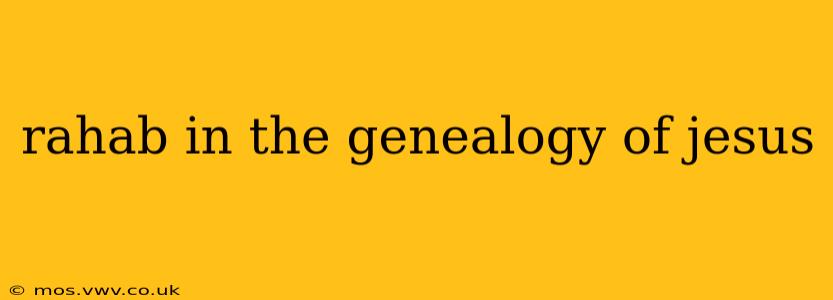Rahab's inclusion in the genealogy of Jesus in Matthew 1:5 is a remarkable detail, challenging traditional expectations and highlighting the inclusive nature of God's salvation. This seemingly unexpected inclusion speaks volumes about God's grace, extending beyond social norms and highlighting the importance of faith, regardless of background. This article will delve into Rahab's story, her significance in the lineage of Jesus, and the theological implications of her presence.
Who Was Rahab?
Rahab wasn't a princess or a queen; she was a Canaanite prostitute living in Jericho. Her story, recounted in Joshua 2 and 6, is one of courage, faith, and shrewdness. When the Israelites, led by Joshua, were poised to conquer Jericho, Rahab chose to protect the Israelite spies who had sought refuge in her home. Her act of faith, defying her own people and risking her life, was rewarded with the promise of salvation for herself and her family. This promise was fulfilled; they were spared during the destruction of Jericho.
Why is Rahab in Jesus' Genealogy?
Matthew's Gospel presents a genealogy of Jesus that deviates significantly from the more commonly known lineage in Luke. Matthew's version, often referred to as the Davidic line, strategically includes several women, including Rahab. This deliberate inclusion challenges the patriarchal norms of the time and speaks volumes about the gospel message. Rahab's presence isn't merely an historical footnote; it's a powerful theological statement.
Rahab: A Testament to God's Unconditional Love
Rahab's inclusion highlights the radical inclusivity of God's grace. She was a Gentile, a woman of questionable reputation in her society, and yet she found favor with God because of her faith. Her story serves as a testament to God's unconditional love, extending to those who might otherwise be considered outsiders or unworthy. This underscores the message that salvation is not limited by social status, ethnicity, or past actions.
A Symbol of Faith and Redemption
Rahab's story is a powerful symbol of faith and redemption. Her act of faith in the God of Israel, despite her circumstances, demonstrates the transformative power of belief. Her inclusion in Jesus' lineage illustrates that redemption is available to all who turn to God in faith. She represents those who, despite their past, have embraced God's forgiveness and found new life in Him.
What Does Rahab's Inclusion Teach Us?
Rahab's inclusion in the genealogy of Jesus offers several key theological insights:
- God's Grace Extends to All: Rahab's story demonstrates that God's grace knows no bounds. It is available to everyone, regardless of their background or past.
- Faith Overcomes Obstacles: Rahab's faith, despite the risks and challenges, led to her salvation and inclusion in the lineage of Christ. This highlights the power of faith to overcome seemingly insurmountable obstacles.
- God's Plan is Inclusive: Rahab's presence in the genealogy reveals that God's plan of salvation is not limited to a select few. It embraces people from all walks of life and backgrounds.
- Redemption is Possible: Rahab's story is a powerful reminder that redemption is possible for everyone, regardless of their past sins or mistakes.
Frequently Asked Questions (FAQs)
Was Rahab a Good Person?
While Rahab's profession was considered morally questionable by the standards of her time and ours, her actions demonstrate a profound faith and willingness to risk everything for what she believed to be right. Her story illustrates that even those with flawed pasts can find redemption and grace in God.
How Did Rahab's Family Benefit from Her Faith?
Rahab's faith not only saved her life but also secured the lives of her entire family. They were spared during the destruction of Jericho, demonstrating the far-reaching consequences of faith and God's covenant keeping.
What is the Significance of Rahab's Scarlet Cord?
The scarlet cord hanging from Rahab's window served as a symbol of God's protection. It marked her home, indicating to the Israelites that she and her family were to be spared. This symbolizes the protection offered to those who trust in God.
Why is Rahab's Story Important Today?
Rahab's story remains relevant because it offers a message of hope and redemption to people from all walks of life. It shows that God's grace extends to those who are marginalized, overlooked, or struggling with their past. Her story is a powerful reminder of God's inclusive love and the transformative power of faith.
Rahab's inclusion in Jesus' genealogy is not a trivial detail but a powerful theological statement. It challenges our preconceived notions about who is worthy of God's grace and affirms the inclusive nature of God's love. Her story continues to inspire and challenge us to embrace God's grace and to extend compassion and understanding to others.
